Dolce far niente
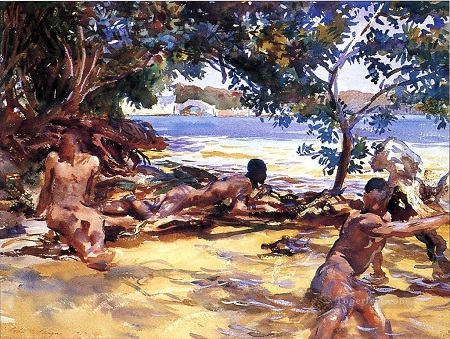
The Bathers door John Singer Sargent, 1917
Baders hartewens
Dwars door de tuinen
Van roos en ranken
Zich ‘t pad te banen,
Dan door de lanen
Van zand en dennen
Vluchtig te rennen
Tot waar de kruinen
Van hoge duinen
In ‘t blauwe blanken
En zo te naderen
Met zwellende aderen
In laatste loop
De harde golven
En, overdolven,
Hun koele doop.

Albert Verwey (15 mei 1865 – 8 maart 1937)
Amsterdam, 19e eeuw. Albert Verwey werd geboren in Amsterdam
De Nederlandse Cornelis Jan (Kees) Stip werd geboren in Veenendaal op 25 augustus 1913. Zie ook alle tags voor Kees Stip op dit blog.
Op een eendagsvlieg
‘Ach,’ sprak een eendagsvlieg te Doorn,
‘hoe heerlijk is het ochtendgloren
en hoe verrukkelijk het uur
waarop het laaiend zonnevuur
verstild ter kimme wordt gedreven!
Men moest twee dagen kunnen leven.’
Hoogeveens verbeterd leesplankje
Op hoge poten stond het voor de klas
met platen door de juffrouw aangewezen
en letters om de namen mee te lezen
alsof je niet vanzelf zag wat het was.
Het lam had van het vuur niet veel te vrezen,
de schapen stonden grazend in het gras.
Als letterkundige begreep je pas
dat mies geen jet en jet geen mies kon wezen.
En ’s avonds met het maanlicht door de ramen,
te wakker om te slapen en te moe
om te begrijpen waarvandaan en hoe,
lag je te wachten tot de letters kwamen
en dansten in je kleine paradijs
als aap noot mies wim zus jet teun vuur gijs.
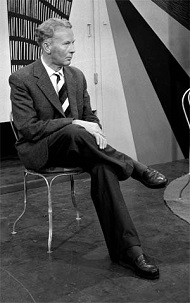
Kees Stip (25 augustus 1913 – 27 juni 2001)
De Engelse schrijver Martin Amis werd geboren op 25 augustus 1949 in Cardiff, South Wales. Zie ook alle tags voor Martin Amis op dit blog en ook mijn blog van 25 augustus 2010.
Uit: Night Train
« I started out as a beat cop in the Southern. I was part of the Neighborhood Stabilization Unit in the Forty-Four. We walked foot patrol and did radio runs. Then for five years I was in the Senior Citizens Robbery Unit. Going proactive–decoy and entrapment–was my ticket to plainclothes. Later, another test, and downtown, with my shield. I’m now in Asset Forfeiture, but for eight years I was in Homicide. I worked murders. I was a murder police.
A few words about my appearance. The physique I inherited from my mother. Way ahead of her time, she had the look now associated with highly politicized feminists. Ma could have played the male villain in a postnuclear road movie. I copped her voice, too: It has been further deepened by three decades of nicotine abuse. My features I inherited from my father. They are rural rather than urban–flat, undecided. The hair is dyed blonde. I was born and raised in this city, out in Moon Park. But all that went to pieces, when I was ten, and thereafter I was raised by the state. I don’t know where my parents are. I’m five-ten and I go 180.
Some say you can’t top the adrenaline (and the dirty cash) of Narcotics, and all agree that Kidnapping is a million laughs (if murder in America is largely black on black, then kidnapping is largely gang on gang), and Sex Offenses has its followers, and Vice has its votaries, and Intelligence means what it says (Intelligence runs deep, and brings in the deep-sea malefactors), but everyone is quietly aware that Homicide is the daddy. Homicide is the Show.
In this second-echelon American city, mildly famed for its Jap-financed Babel Tower, its harbors and marinas, its university, its futuristically enlightened corporations (computer software, aerospace, pharmaceuticals), its high unemployment, and its catastrophic inner-city taxpayer flight, a homicide police works maybe a dozen murders per year. Sometimes you’re a primary investigator on the case, sometimes a secondary. I worked one hundred murders. My clearance rate was just above average. I could read a crime scene, and, more than once, I was described as an “exceptional interrogator.” My paperwork was outstanding. When I came to CID from the Southern everybody expected my reports to be district quality. But they were downtown quality, right from the start. And I sought to improve still further and gave it a hundred percent. One time I did a very, very competent job, collating two rival accounts of a hot-potato homicide in the Seventy-Three: One witness/suspect versus another witness/suspect. “Compared to what you guys give me to read,” pronounced Detective Sergeant Henrik Overmars, brandishing my report at the whole squad, “this is fucking oratory. It’s goddamn Cicero versus Robespierre.”
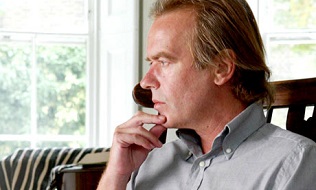
Martin Amis (Cardiff, 25 augustus 1949)
De Britse schrijver Howard Jacobson werd geboren op 25 augustus 1942 in Manchester. Zie ook alle tags voor Howard Jacobson op dit blog.
Uit: Shylock Is My Name
“It is one of those better-to-be-dead-than-alive days you get in the North of England in February, the space between the land and sky a mere letterbox of squeezed light, the sky itself unfathomably banal. A stage unsuited to tragedy, even here where the dead lie quietly. There are two men in the cemetery, occupied in duties of the heart. They don’t look up. In these parts you must wage war against the weather if you don’t want farce to claim you.
Signs of just such a struggle are etched on the face of the first of the mourners, a man of middle-age and uncertain bearing, who sometimes walks with his head held arrogantly high, and at others stoops as though hoping not to be seen. His mouth, too, is twitchy and misleading, his lips one moment twisted into a sneer, the next fallen softly open, as vulnerable to bruising as summer fruit. He is Simon Strulovitch – a rich, furious, but easily hurt philanthropist with on-again off-again enthusiasms, a distinguished collection of twentieth-century Anglo-Jewish art and old Bibles, a passion for Shakespeare (whose genius and swashbuckling Sephardi looks he once thought could only be explained by the playwright’s ancestors having changed their name from Shapiro, but now he isn’t sure), honorary doctorates from universities in London, Manchester and Tel Aviv (the one from Tel Aviv is something else he isn’t sure about) and a daughter going off the rails. He is here to inspect the stone that has recently been erected at the head of his mother’s grave, now that the 12 months of mourning for her has elapsed. He hasn’t mourned her conscientiously during that period – too busy buying and lending art, too busy with his foundations and endowments, or ‘benefacting,’ as his mother called it with mixture of pride and concern (she didn’t want him killing himself giving money away), too busy settling scores in his head, too busy with his daughter – but he intends to make amends. There is always time to be a better son.
Or a better father. Could it be that it’s his daughter he’s really getting ready to mourn? These things run in families. His father had briefly mourned him. ‘You are dead to me!’ And why? Because of his bride’s religion. Yet his father wasn’t in the slightest bit religious.
‘Better you were dead at my feet…’
Would that really have been better?”
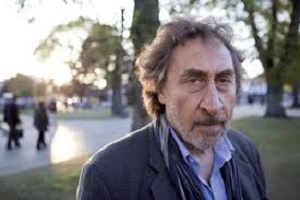
Howard Jacobson (Manchester, 25 augustus 1942)
De Amerikaanse dichter Charles Wright werd geboren op 25 augustus 1935 in Pickwick Dam, Tennessee. Zie ook alle tags voor Charles Wright op dit blog en ook mijn blog van 25 augustus 2010.
The Appalachian Book of the Dead
Sunday, September Sunday … Outdoors,
Like an early page from The Appalachian Book of the Dead,
Sunlight lavishes brilliance on every surface,
Doves settle, surreptitious angels, on tree limb and box branch,
A crow calls, deep in its own darkness,
Something like water ticks on
Just there, beyond the horizon, just there, steady clock …
Go in fear of abstractions …
Well, possibly. Meanwhile,
They are the strata our bodies rise through, the sere veins
Our skins rub off on.
For instance, whatever enlightenment there might be
Housels compassion and affection, those two tributaries
That river above our lives,
Whose waters we sense the sense of
late at night, and later still.
Uneasy, suburbanized,
I drift from the lawn chair to the back porch to the dwarf orchard
Testing the grass and border garden.
A stillness, as in the passageways of Paradise,
Bell jars the afternoon.
Leaves, like ex votos, hang hard and shine
Under the endlessness of heaven.
Such skeletal altars, such vacant sanctuary.
It always amazes me
How landscape recalibrates the stations of the dead,
How what we see jacks up
the odd quotient of what we don’t see,
How God’s breath reconstitutes our walking up and walking down.
First glimpse of autumn, stretched tight and snicked, a bad face lift,
Flicks in and flicks out,
a virtual reality.
Time to begin the long division.
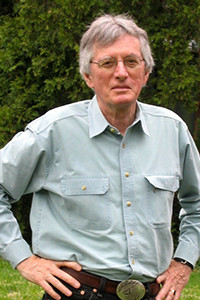
Charles Wright (Pickwick Dam, 25 augustus 1935)
De Duitse schrijver Maxim Biller werd geboren op 25 augustus 1960 in Praag. Zie ook alle tags voor Maxim Biller op dit blog en ook mijn blog van 25 augustus 2010.
Uit:Im Kopf von Bruno Schulz
„Es funktionierte, wie fast immer, und schon saß er wieder am Tisch und schrieb auf eine neue, leere Seite schnell und ohne zu überlegen: »Lieber Dr. Thomas Mann! Obwohl wir uns nicht persönlich kennen, muss ich Sie darüber informieren, dass vor drei Wochen ein Deutscher in unsere Stadt gekommen ist, der behauptet, Sie zu sein. Da ich Sie, wie wir alle in Drohobycz, nur von Fotografien aus den Zeitungen kenne, kann ich nicht mit letzter Sicherheit sagen, dass Sie es nicht sind, aber allein die Geschichten, die er erzählt – von seiner abgetragenen Kleidung und dem starken Körpergeruch abgesehen, der ihn umgibt -, machen ihn verdächtig.«
So, sehr gut, das genügt für den Anfang, dachte der kleine, ernste Mann in dem Keller in der Florianskastraße zufrieden und schob den Bleistift es war ein Koh-i-Noor HB, mit dem man notfalls auch zeichnen konnte – in die Innentasche seines dicken, belgischen ]acketts, das er das ganze Jahr trug. Dann klappte er das schwarze Notizbuch mit dem leeren Etikett auf dem Deckblatt zu und streichelte, als wäre er nicht er selbst, sein Gesicht.
Er hatte das erste Mal an diesem Tag, nein, das erste Mal seit vielen Monaten, vielleicht sogar seit Jahren, nicht mehr das Gefühl, als würden gleich aus den Wänden um ihn herum große, schwarze Echsen und böse grinsende, schielende, petrolgrüne Schlangen herauskriechen, er hörte nicht wie sonst alle paar Minuten hinter sich das Schlagen und Rauschen riesiger Archaeopteryxflügel, er fürchtete nicht, dass sich schon bald, ganz bald etwas unvorstellbar Schreckliches ereignen würde.“
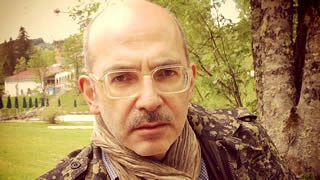
Maxim Biller (Praag, 25 augustus 1960)
Zie voor nog meerschrijvers van de 25e augustus ook mijn blog van 25 augustus 2015 en ook mijn blog van 25 augustus 2014 en ook mijn blog van 25 augustus 2013 deel 2.
